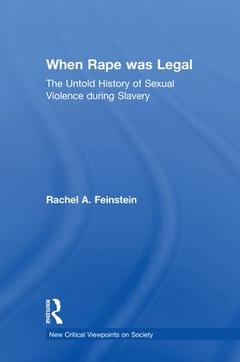When Rape was Legal The Untold History of Sexual Violence during Slavery New Critical Viewpoints on Society Series
Auteur : Feinstein Rachel A.

When Rape was Legal is the first book to solely focus on the widespread rape perpetrated against enslaved black women by white men in the United States. The routine practice of sexual violence against enslaved black women by white men, the motivations for this rape, and the legal context that enabled this violence are all explored and scrutinized. Enlightening analysis found that rape was not merely a result of sexual desire and opportunity, or simply a form of punishment and racial domination, but instead encompassed all of these dimensions as part of the identity of white masculinity. This provocative text highlights the significant role that white women played in enabling sexual violence against enslaved black women through a variety of responses and, at times, through their lack of response to the actions of the white men in their lives. Significantly, this book finds that sexual violence against enslaved black women was a widespread form of oppression used to perform white masculinity and reinforce an intersectional hierarchy. Additionally, white women played a vital role by enabling this sexual violence and perpetuating the subordination of themselves and those subordinate to them.
Chapter 1. Introduction Chapter 2. The Voices of Black Women & Black Men: Why Sexual Violence by White Men was Rampant during Slavery Chapter 3. White Masculinity and Sexual Violence against Enslaved Black Women Chapter 4. White Women’s Role in Sexual Violence of Enslaved Black Women Chapter 5. The Power of Language: White Women’s Divorce Petitions Chapter 6. Racialized & Gendered Sexual Violence Today
Rachel A. Feinstein received her Ph.D. in Sociology from Texas A&M University in 2014. She has since worked as Assistant Professor of Sociology and Criminal Justice at Carthage College in Wisconsin, and is currently teaching in the Sociology Department at California State University, Fullerton. Her research, both contemporary and historical, combines Criminology, Race/Ethnicity and Gender Studies, and can be found in several sociology and criminology journals.
Date de parution : 08-2018
15.2x22.9 cm
Date de parution : 08-2018
15.2x22.9 cm
Thèmes de When Rape was Legal :
Mots-clés :
Enslaved Black Women; White Racial Framing; Rape; Enslaved Women; Slavery; Works Progress Administration Slave Narratives; Sexual Violence; Federal Writer’s Project; Patriarchy; Systemic Racism Theory; White masculinity; Intersectional Hierarchy; masculinity; Enslaved Men; racial domination; American history; Young Men; African American History; Black Women; Race; White Femininity; Class; White Sexism; Gender; Married White Women; Sexuality; White Male Entitlement; Feminist Theory; White Women; Colonialism; Divorce Petitions; Race and Ethnic Studies; Light Skinned Black Women; American Studies; Play Thing; Historical Methods; Sexual Assault Victimization; Citizenship; Rape Victimization; Colonial America; Adulterous Intercourse; Intersectional Location; Intoxicated Woman; Free White Men



